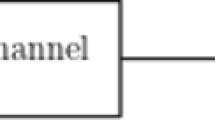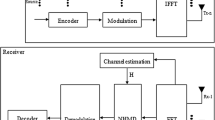Abstract
A low-complexity, packet-level iterative detection technique is considered for slow-frequency-hop (SFH) spread-spectrum communications in intersymbol-interference (ISI) channels. Maximum-likelihood sequence estimation (MLSE) equalization with state pinning and bounded-distance errors-and-erasures decoding of Reed–Solomon code words are employed within each iteration of equalization and decoding. The design of a bit interleaver is examined for use with the iterative detection technique. The effect of state pinning on the equalizer performance is characterized, and the probability of packet error and the detection complexity of the SFH system are evaluated for a range of static and fading ISI channels. The use of an early-termination criterion is also considered as a way to achieve a tradeoff between performance and detection complexity with the iterative detection technique.












Similar content being viewed by others
References
M. B. Pursley, The role of spread spectrum in packet radio networks, Proceedings of the IEEE, Vol. 75, No. 1, pp. 116–134, 1987.
M. B. Pursley, Reed–Solomon codes in frequency-hop communications. In V. K. Bhargava and S. B. Wicker (eds), Reed–Solomon Codes and Their Applications. IEEE Press, New York, pp. 150–174, 1994.
S. Ahmed, L.-L. Yang, and L. Hanzo, Erasure insertion in RS-Coded SFH MFSK subjected to tone jamming and Rayleigh fading, IEEE Transactions on Vehicular Technology, Vol. 56, No. 6, Part 1, pp. 3563–3571, 2007.
B. J. Hamilton, SINCGARS system improvement program (SIP) specific radio improvements. In Proceedings of 1996 Tactical Communications Conference, Ft. Wayne, IN, pp. 397–406, 1996.
H. Ramchandran and D. L. Noneaker, Adaptive equalization and Reed–Solomon coding in high-data-rate frequency-hop spread-spectrum communications, International Journal of Wireless Information Networks, Vol. 8, No. 2, pp. 61–74, 2001.
G. D. Forney Jr., Maximum-likelihood sequence estimation of digital sequences in the presence of intersymbol interference, IEEE Transactions on Information Theory, Vol. IT-18, No. 3, pp. 363–378, 1972.
A. W. Lam and D. V. Sarwate, A comparison of two methods for generation of side information in frequency-hop spread-spectrum multiaccess communications. In Proceedings of 21st Annual Conf. Inform. Sci. Syst., Baltimore, MD, pp. 869–877, 1987.
E. Paaske, Improved decoding for a concatenated coding system recommended by CCSDS, IEEE Transactions on Communications, Vol. 38, No. 8, pp. 1138–1144, 1990.
O. M. Collins and M. Hizlan, Determinate state convolutional codes. IEEE Transactions on Communications, Vol. 41, No. 12, pp. 1785–1794, 1993.
M. Tüchler, R. Koetter, and A. C. Singer, Turbo equalization: Principles and new results. IEEE Transactions on Communications, Vol. 50, No. 5, pp. 754–767, 2002.
J. L. Cromwell, G. Paparisto, and K. M. Chugg, On the design and hardware demonstration of a robust, high-speed frequency-hopped radio for severe battlefield channels. In Proceedings of 2002 IEEE Military Communications Conference, Anaheim, CA, pp. 899–903, 2002.
X. Tan and J. M. Shea, Iterative detection and estimation for multiple access interference mitigation in asynchronous frequency-hop spread spectrum. In Proceedings of 2006 IEEE Military Communications Conference, Washington, DC, 2006.
J. H. Kang and W. E. Stark, Turbo codes for noncoherent FS-SS with partial-band interference, IEEE Transactions on Communications, Vol. 46, No. 11, pp. 1451–1458, 1998.
J. H. Kang and W. E. Stark, Iterative estimation and decoding for FH-SS with slow Rayleigh fading, IEEE Transactions on Communications, Vol. 48, No. 12, pp. 2014–2023, 2000.
H. El Gamal and E. Geraniotis, Iterative channel estimation and decoding for convolutionally coded anti-jam FH signals, IEEE Transactions on Communications, Vol. 50, No. 2, pp. 321–331, 2002.
W. G. Phoel, Iterative demodulation and decoding of frequency-hopped PSK in partial-band jamming, IEEE Journal on Selected Areas in Communications, Vol. 23, No. 5, pp. 1026–1033, 2005.
H. Kim et al., Anti-jamming performance of slow FH-CPM signals with concatenated coding and jamming estimation. In Proceedings of 2003 IEEE Military Communications Conference, Boston, MA, pp. 1120–1125, 2003.
Q. Zhang and T. Le-Ngoc, Turbo product codes for FH-SS with partial-band interference, IEEE Transactions on Wireless Communications, Vol. 1, No. 3, pp. 513–520, 2002.
M. B. Pursley and J. S. Skinner, Turbo product coding in frequency-hop wireless communications with partial-band interference. In Proceedings of 2002 IEEE Military Communications Conference, Anaheim, CA, Vol. 2, pp. 774–779, 2002.
S. Cheng, M. C. Valenti, and D. Torrieri, Robust iterative noncoherent reception of coded FSK over block fading channels, IEEE Transactions on Wireless Communications, Vol. 6, No. 9, pp. 3142–3147, 2007.
D. Torrieri, S. Cheng, and M. C. Valenti, Robust frequency-hopping system for channels with interference and frequency-selective fading. In Proceedings of 2007 IEEE International Conference on Communications, Glasgow, Scotland, 2007.
T. G. Macdonald and M. B. Pursley, Staggered interleaving and iterative errors-and-erasures decoding for frequency-hop packet radio. IEEE Transactions on Wireless Communications, Vol. 2, No. 1, pp. 92–98, 2003.
H. Ramchandran and D. L. Noneaker, Packet-level iterative detection for SFH communications with Reed–Solomon coding in partial-band interference. In Proceedings of 2006 IEEE Military Communications Conference, Washington D.C., 2006.
R. M. Pyndiah, Near-optimum decoding of product codes: Block turbo codes. IEEE Transactions on Communications, Vol. 46, No. 8, pp. 1003–1010, 1998.
M. Lamarca, J. Sala, and A. Martinez, Advanced decoding algorithms for Reed–Solomon/convolutional concatenated codes. Annals of Telecommunications, Vol. 60, No. 1–2, pp. 45–78, 2005.
M. K. Cheng and P. H. Siegel, Iterative soft-decision Reed–Solomon decoding on partial response channels. In Proceedings of 2003 IEEE Global Communications Conference, San Francisco, CA, pp. 1588–1592, 2003.
D. Chase, A class of algorithms for decoding block codes with channel measurement information. IEEE Transactions on Information Theory, Vol. IT-18, No. 1, pp. 170–182, 1972.
R. Koetter and A. Vardy, Algebraic soft-decision decoding of Reed–Solomon codes, IEEE Transactions on Information Theory, Vol. 49, No. 11, pp. 2809–2825, 2003.
J. Jiang and K. R. Narayanan, Iterative soft decoding of Reed–Solomon codes. IEEE Communications Letters, Vol. 8, No. 4, pp. 244–246, 2004.
M. El-Khamy and R. J. McEliece, Iterative algebraic soft-decision list decoding of Reed–Solomon codes. IEEE Journal of Selected Areas in Communications, Vol. 24, No. 3, pp. 481–490, 2006.
P. A. Bello, Characterization of randomly time-variant linear channels, IEEE Transactions on Communications Systems, Vol. CS-11, No. 4, pp. 360–393, 1963.
P. A. Bello and B. D. Nelin, The influence of fading spectrum on the binary error probabilities of incoherent and differentially coherent matched filter receivers, IRE Transactions on Communications Systems, Vol. CS-10, No. 2, pp. 160–168, 1962.
H. Ramchandran, Low-complexity iterative detection techniques for SFH spread-spectrum communications, Ph.D. dissertation, Clemson University, May 2007.
H. Ramchandran and D. L. Noneaker, A comparison of two iterative equalization-and-decoding techniques in frequency-hop spread-spectrum communications using Reed–Solomon coding. In Proceedings of 2004 IEEE Vehicular Technology Conference, Los Angeles, CA, pp. 1713–1717, 2004.
F. Magee and J. Proakis, An estimate of the upper bound on error probability for maximum-likelihood sequence estimation on channels having a finite-duration impulse response. IEEE Transactions on Information Theory, Vol. IT-19, No. 5, pp. 699–702, 1973.
J. G. Proakis, Digital Communications 4th ed. McGraw-Hill, New York, 2001.
R. Anderson and G. Foschini, The minimum distance for MLSE digital data systems of limited complexity, IEEE Transactions on Information Theory, Vol. IT-21, No. 5, pp. 544–551, 1975.
Acknowledgements
This material is based upon work supported by the U.S. Army Research Laboratory and the U.S. Army Research Office under grant DAAD-19-03-1-0206. Some results from this work were presented at the 2005 International Symposium on Communication Theory and Applications (Ambleside, UK).
Author information
Authors and Affiliations
Corresponding author
Rights and permissions
About this article
Cite this article
Ramchandran, H., Noneaker, D.L. Iterative Equalization and Decoding for SFH Spread-Spectrum Communications using Reed–Solomon Codes. Int J Wireless Inf Networks 15, 1–15 (2008). https://doi.org/10.1007/s10776-007-0069-y
Received:
Accepted:
Published:
Issue Date:
DOI: https://doi.org/10.1007/s10776-007-0069-y




